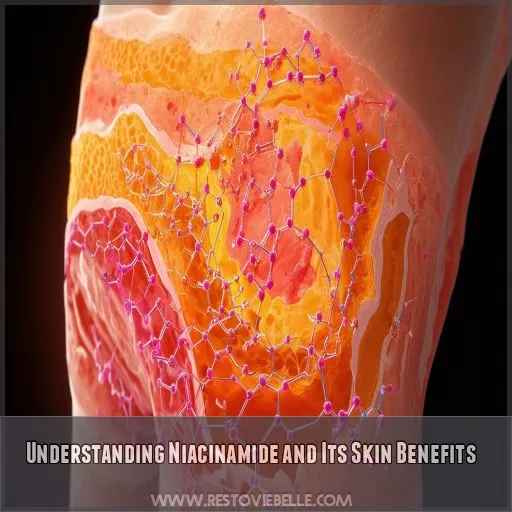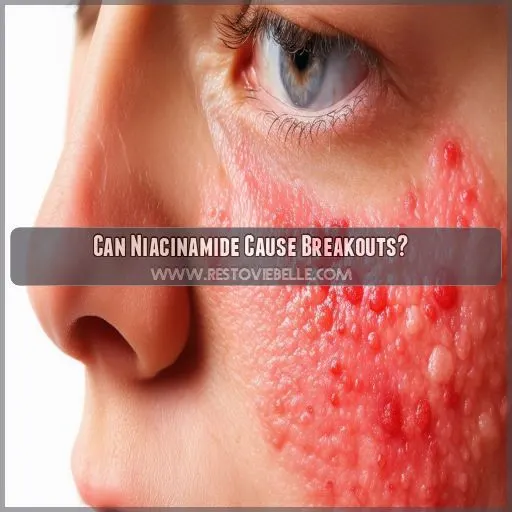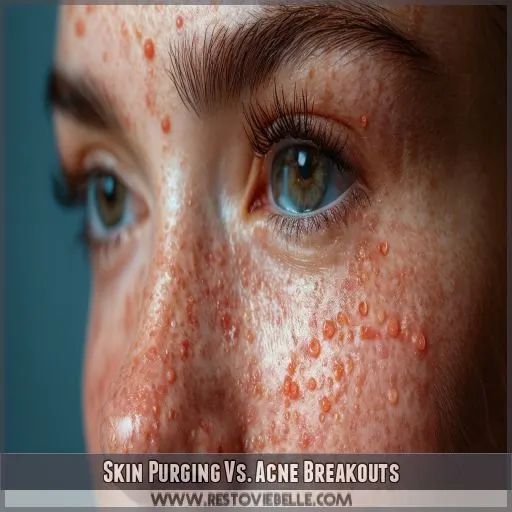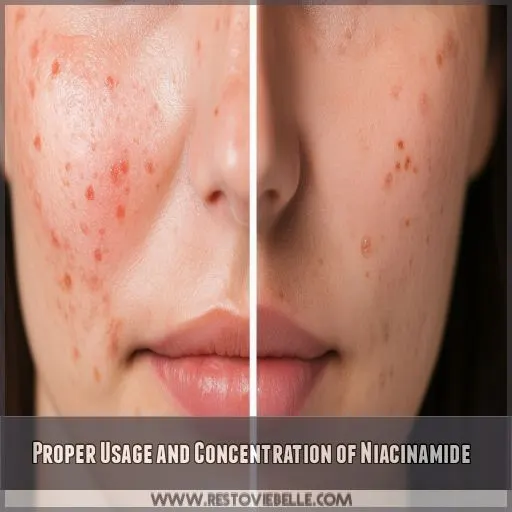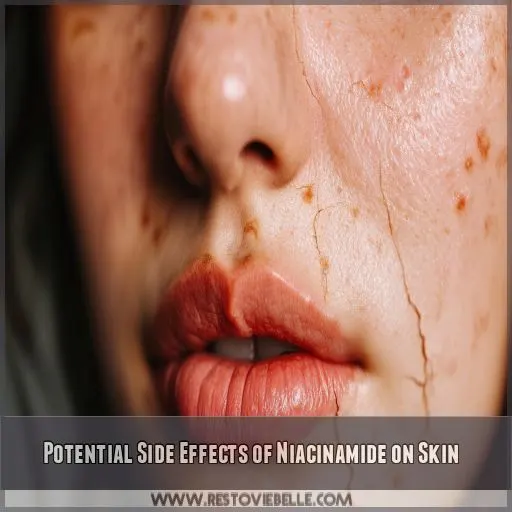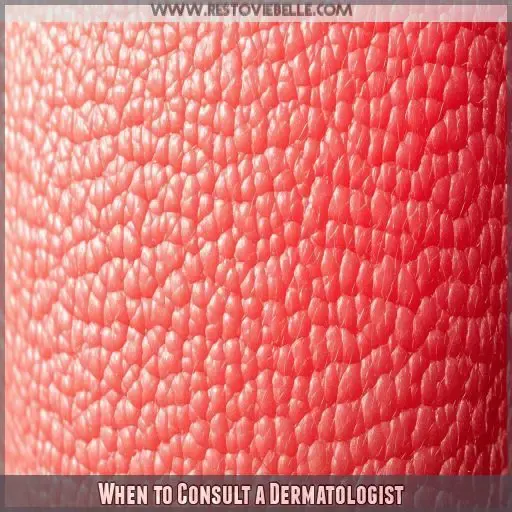This site is supported by our readers. We may earn a commission, at no cost to you, if you purchase through links.
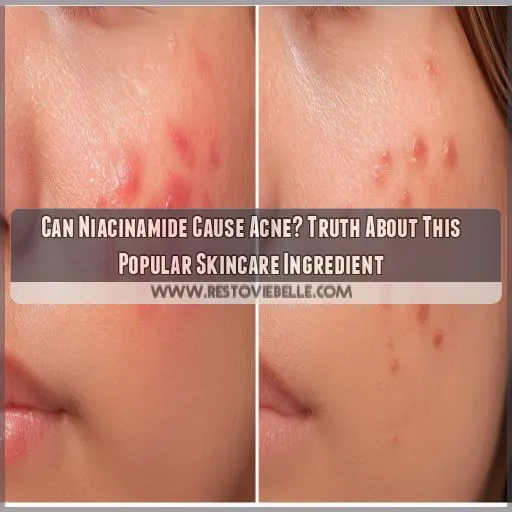 Ironically, this very ingredient that is supposedly to help with anti-acne is said to cause acne—niacinamide. This makes perusing the skincare aisle confusing, so it’s essential to understand niacinamide’s role.
Ironically, this very ingredient that is supposedly to help with anti-acne is said to cause acne—niacinamide. This makes perusing the skincare aisle confusing, so it’s essential to understand niacinamide’s role.
In this post, I have detailed all the skin benefits of niacinamide and its connection with acne. All of that confusion between breakouts and purging—it sorts out things well. You will get evidence-based guidance on proper usage, potential side effects, and when you do require professional advice, for that matter.
Get clarity and confidence to empower your skincare choices.
Table Of Contents
- Key Takeaways
- Can Niacinamide Cause Acne?
- Understanding Niacinamide and Its Skin Benefits
- The Relationship Between Niacinamide and Acne
- Can Niacinamide Cause Breakouts?
- Skin Purging Vs. Acne Breakouts
- Proper Usage and Concentration of Niacinamide
- Potential Side Effects of Niacinamide on Skin
- When to Consult a Dermatologist
- Frequently Asked Questions (FAQs)
- How long does niacinamide purging last?
- Can I use niacinamide if I have pimples?
- Can niacinamide cause skin problems?
- How to know if niacinamide is working?
- Can niacinamide cause acne?
- Does niacinamide cause breakouts?
- What are the side effects of niacinamide cream?
- Is niacinamide good for skin?
- How does niacinamide work with other acne treatments?
- Can niacinamide help with aging skin concerns?
- Are there oral supplements with niacinamide benefits?
- What are natural sources of niacinamide?
- Is niacinamide safe for all skin types?
- Conclusion
Key Takeaways
- Niacinamide can be an ally against acne, helping to quell inflammation, regulate oil production, and banish bacteria.
- Patience is a virtue when introducing niacinamide into your skincare routine. Some may experience a temporary "purge" as their skin adjusts.
- Overdoing it with niacinamide can lead to irritation, so start with a gentle concentration and work your way up as your skin gets acquainted.
- If you’re still breaking out after giving niacinamide a fair shot, it might be time to consult a dermatologist to rule out any underlying issues and find the best solution for your skin.
Can Niacinamide Cause Acne?
Niacinamide, a form of Vitamin B3, is a superstar in skincare due to its anti-acne properties. It reduces inflammation, regulates sebum production, and fights acne-causing bacteria while rarely causing acne. Some might experience ‘skin purging,’ where breakouts occur before the skin improves, which is different from usual acne breakouts. Using niacinamide in the recommended 2-5% concentration and combining it with moisturizers and sunscreen can maximize benefits. Always patch test first to avoid any adverse reactions.
Curious to discover how niacinamide can transform your skincare routine? You’re in for a treat!
Understanding Niacinamide and Its Skin Benefits
Niacinamide, a popular skincare ingredient, offers several benefits for acne-prone skin. It helps strengthen your skin barrier, regulate oil production, and has anti-inflammatory properties that can reduce redness and swelling associated with acne breakouts.
Niacinamides Anti-Acne Properties
Niacinamide’s anti-acne properties make it a powerful ally in your skincare routine. This versatile ingredient tackles acne from multiple angles:
- Reduces inflammation, calming angry pimples
- Regulates sebum production, preventing clogged pores
- Fights acne-causing bacteria
You’ll find niacinamide in various products, suitable for different skin types. When combined with other acne-fighting ingredients, it can boost their effectiveness. Remember, the right dosage is key – start low and gradually increase to avoid potential irritation.
Skin Barrier Strengthening
Beyond its acne-fighting prowess, niacinamide’s skin barrier strengthening capabilities are truly impressive. This powerhouse ingredient works on multiple levels to fortify your skin’s natural defenses. Let’s break down how niacinamide derivatives benefit your skin barrier through topical application and oral intake:
| Benefit | Topical | Oral |
|---|---|---|
| Ceramide Production | Boosts | Supports |
| Hydration | Locks in moisture | Improves overall hydration |
| Inflammation | Reduces redness | Calms systemic inflammation |
| Skin Resilience | Enhances protection | Strengthens from within |
Oil Production Regulation
Niacinamide’s oil production regulation is a game-changer for acne-prone skin. It helps curb excess sebum, reducing that greasy feeling you hate. By minimizing pores and calming inflammation, it’s your ally against breakouts.
But it’s not just about acne – this vitamin B3 superstar also boasts anti-aging effects.
While side effects like flushing are rare, remember: moderation is key to avoid potential issues like pellagra.
The Relationship Between Niacinamide and Acne
Niacinamide’s relationship with acne is complex, as it can help regulate sebum production and reduce inflammation associated with breakouts. While it’s generally beneficial for acne-prone skin, some individuals may experience initial purging or irritation when introducing niacinamide into their skincare routine.
How Niacinamide Affects Skin
Niacinamide could exert its mechanism of action on your skin by working with inflammation, a key player in acne severity, possibly even influencing the balance of your gut microbiome. While it can’t quite prove itself as a panacea for different acne types, it does show great promise for managing conditions like rosacea and even protecting against sun damage.
Most interestingly, benefits extend beyond acne to potentially aid in managing diabetes or even reducing cancer risks.
Potential Acne-Fighting Properties
Niacinamide is renowned for its acne-fighting properties. It reduces inflammation and redness, calms the skin, and can help with rosacea symptoms. Its anti-inflammatory effects support healthier skin, minimizing bumps and reducing discoloration. Ideal concentrations range from 2-5%, making it effective yet gentle. This makes niacinamide beneficial for treating acne and aging skin issues alike.
Can Niacinamide Cause Breakouts?
Can niacinamide cause breakouts? While rare, it’s possible. Here’s what you need to know:
- Niacinamide Purge: When first using niacinamide, you might experience a temporary purge, where your skin sheds and brings underlying issues to the surface, resembling acne.
- Dosage and Timing: Applying high concentrations or overusing niacinamide can lead to irritation, which may look like breakouts. Sticking to concentrations between 2-5% is advisable.
- Personal Reaction: Everyone’s skin reacts differently. If you notice persistent breakouts, it may not be a purge but rather an actual reaction.
Act mindfully, observe how your skin responds over time, and consult with a dermatologist if issues persist. Niacinamide remains a valuable tool when used correctly.
Skin Purging Vs. Acne Breakouts
As one introduces niacinamide into their skincare routine, they should, therefore, tell the difference between skin purging and acne breakouts. Skin purging is when active ingredients in skincare increase cell turnover, exaggerating skin irritation and blemishes within areas more prone to acne temporarily. On the other hand, new breakouts could indicate an allergic reaction or incompatibility with niacinamide at high concentrations.
| Skin Purging | Acne Breakouts |
|---|---|
| Temporary worsening | Persistent blemishes |
| Typically in problem areas | Random skin spots |
| Improves over time | May worsen progressively |
These differences will help you adjust your regimen with the confidence of knowing when your skin is changing or if the product isn’t the right fit.
Proper Usage and Concentration of Niacinamide
The best way to use niacinamide is in products that offer a 2-5% concentration and provide clear instructions for application. These instructions ensure you don’t irritate your skin while you get the most from these compounds.
Recommended Dosage
To use niacinamide effectively, consider these guidelines:
- Concentration: Use products with 2-5% niacinamide to avoid irritation and maximize benefits.
- Patch Testing: Check skin sensitivity by applying a small amount to a discrete area before full use.
- Age and Pregnancy: Consult healthcare providers for advice on using niacinamide, especially during pregnancy or when considering age restrictions.
Application Techniques
To apply niacinamide effectively, start with a clean face. Choose products with 2-5% niacinamide. Perform a sensitivity test on your wrist before use. Apply the product twice daily, gently massaging it into your skin. Use in combination with moisturizers and sunscreen for best results. Here’s a quick reference:
| Application Step | Frequency | Product Type |
|---|---|---|
| Cleanse | Twice daily | Cleanser |
| Apply Niacinamide | Twice daily | Serum/Toner |
| Moisturize and Protect | Morning | Moisturizer/Sunscreen |
Potential Side Effects of Niacinamide on Skin
When using niacinamide, you should be aware of potential side effects that can arise. High niacinamide concentration might lead to skin irritation, including redness, itching, or inflammation.
Some people may experience flushing, especially in sensitive areas. Allergic reactions, while rare, can also occur and may manifest as rashes or more severe irritation.
Long-term effects are generally minimal, but it’s essential to monitor your skin’s response over time. Additionally, niacinamide may interact with other skincare products, potentially amplifying side effects.
For example, its combination with certain acne medications can sometimes exacerbate irritation. Always follow usage guidelines closely to minimize these risks and ensure you reap the benefits safely.
When to Consult a Dermatologist
It’s essential to consult a dermatologist if you observe signs of allergy to niacinamide, severe irritation, or sensitivity. The probable forms through which an allergic reaction to niacinamide could manifest are redness, itching, or burning at the application site. High dosages of niacinamide might increase this at times.
Lastly, if you continue to face skin issues or new breakouts despite properly using and taking the right concentration, expert advice may help with more personalized tips and alternative treatments. Dermatologists can help determine the right niacinamide concentration based on your skin type and condition. Never hesitate to ask for help in this area of health, as it’s relevant to your skin’s health and comfort.
Remember that using professional guidance ensures that you’re making use of niacinamide in the right way and regard to your safety.
Frequently Asked Questions (FAQs)
How long does niacinamide purging last?
Can I use niacinamide if I have pimples?
You can use niacinamide if you have pimples. It reduces inflammation, redness, and oil production, which can help treat acne. However, follow the product instructions carefully to minimize potential skin irritation.
Can niacinamide cause skin problems?
Niacinamide can cause skin problems when used in high concentrations, such as redness, inflammation, and allergic dermatitis. To avoid these issues, adhere to recommended usage and consult a dermatologist if you have sensitive skin.
How to know if niacinamide is working?
You’ll know niacinamide is working if you notice reduced redness, less oil production, smaller pores, and overall improved skin texture. Give it a few weeks and follow the product instructions for best results.
Can niacinamide cause acne?
Niacinamide typically improves acne, but overuse or high concentrations can irritate your skin, potentially leading to breakouts. Always follow product instructions and consult a dermatologist if you experience any adverse effects.
Does niacinamide cause breakouts?
Niacinamide generally doesn’t cause breakouts; instead, it’s known for reducing acne. Imagine it as a peacekeeper for your skin, calming inflammation and balancing oil production, making it less likely for acne to flare up.
What are the side effects of niacinamide cream?
Niacinamide cream can cause mild side effects like redness, itching, or a burning sensation, especially at high concentrations. Occasionally, allergic reactions such as dermatitis may occur. Always follow product instructions and consult a dermatologist if needed.
Is niacinamide good for skin?
You won’t need a lab coat to understand this—niacinamide is fantastic for your skin. It strengthens the barrier, regulates oil, and minimizes pores, making it an all-around ally in skin health.
How does niacinamide work with other acne treatments?
Niacinamide works well with other acne treatments by reducing inflammation, regulating sebum production, and supporting skin barrier function. It pairs effectively with topical retinoids, salicylic acid, and antibiotics, enhancing their benefits while minimizing potential side effects.
Can niacinamide help with aging skin concerns?
Niacinamide can visibly improve the concerns of aging skin. Studies have shown that it decreases fine lines and wrinkles by 8%. It increases collagen production, reduces pigmentation, and, having strengthened the barrier of one’s skin, promotes a youthful and radiant appearance.
Are there oral supplements with niacinamide benefits?
Yes, you can take oral supplements with niacinamide benefits. These supplements can help prevent vitamin B3 deficiency, improve skin health, support metabolism, and reduce the progression of type 1 diabetes. Consult a healthcare provider first.
What are natural sources of niacinamide?
The natural sources of niacinamide include meat, fish, milk, eggs, green vegetables, and cereals. Including these foods in your diet will supply adequate amounts of this essential nutrient that works to ensure the proper functioning and maintenance of healthy cells within your body.
Is niacinamide safe for all skin types?
Yes, niacinamide is generally safe for all skin types. However, if you have sensitive skin, start with a lower concentration (2-5%) and consult a dermatologist to avoid potential irritation or allergic reactions.
Conclusion
Research shows that up to 80% of people experience clearer skin with niacinamide. Understanding its role can help you determine if niacinamide can cause acne or benefit your skin.
Use niacinamide in recommended concentrations to optimize its benefits while minimizing risks. Be mindful of the distinction between skin purging and acne breakouts.
If adverse effects persist, consult a dermatologist to refine your skincare routine. Equip yourself with knowledge for better skincare choices.

